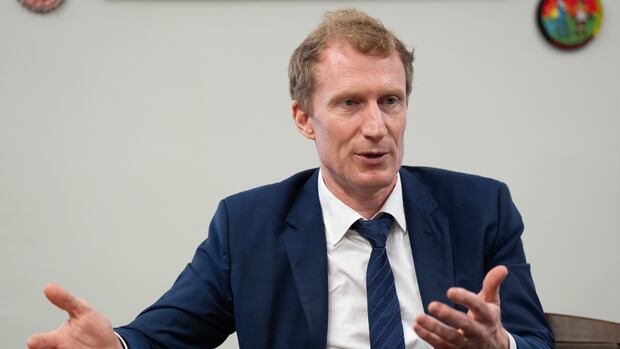Bloc Québécois Leader Yves-François Blanchet is cautioning MPs against making a “partisan show” of a parliamentary probe into the case of two men accused of planning a terror attack in Toronto.
Ahmed Fouad Mostafa Eldidi, 62, and his son Mostafa Eldidi, 26, face multiple charges, including conspiracy to commit murder for the benefit or at the direction of a terrorist group.
On Tuesday, a parliamentary committee agreed to investigate the case and address some unanswered questions about the immigration screening process for both men.
A parliamentary committee has agreed to investigate how Ahmed and Mostafa Eldidi — a father and son accused of plotting a terrorist attack in Toronto — got into Canada. Bloc Québécois Leader Yves-François Blanchet called Immigration Minister Marc Miller’s comments about looking into revoking Ahmed Eldidi’s citizenship a ‘political answer.’
“The more people who enter the country … the more risks there are — it’s true in Canada and elsewhere — that one might miss something along the way,” Blanchet told reporters in Ottawa on Thursday.
“It has to be analyzed very precisely and cautiously. But once again, let’s not make a partisan show of it. Let’s be serious about that kind of issue.”
The committee hearings, set to begin later this month, likely will zero in on Canada’s immigration process, its security screening capacity and how security officials handle domestic threats.
When police announced the arrests late last month they said the two men were “in the advanced stages of planning a serious, violent attack in Toronto.”
The father, who is also accused of committing an aggravated assault in 2015 for the benefit of the Islamic State somewhere outside of Canada, has Canadian citizenship, authorities say. Police said the son does not have citizenship.

Authorities have said part of the case is a graphic video allegedly showing Ahmed Eldidi taking part in that 2015 assault.
Officials have not confirmed whether the senior Eldidi received citizenship before or after the alleged assault abroad.
On Wednesday, Immigration Minister Marc Miller said government is looking into whether Eldidi’s citizenship can be revoked.
The CBC’s Catharine Tunney discusses Immigration Minister Marc Miller’s investigation into whether Canadian citizenship can be revoked from terror suspect Ahmed Fouad Mostafa Eldidi. Miller said he’s ‘disgusted’ by Eldidi and his son’s alleged plan to commit a violent attack in Toronto. Eldidi is also accused of committing an aggravated assault in 2015 for the benefit of the Islamic State somewhere outside of Canada.
“I’m as disgusted as any Canadian. But I have a responsibility to get to the bottom of it and I will,” he said during a morning news conference in Church Point, N.S.
“I’m also going to take the next step, which is to start the preliminary work with the evidence at hand to look at whether the individual in question’s citizenship should be revoked.”
Asked about Miller’s proposal, Blanchet said it appeared to be “a political answer to an issue.”
“The real issue is much deeper. Do we do enough, when we are a welcoming territory, to protect our own people against a very well known and documented threat as ISIS?” he said.
Canadian citizenship can be revoked if it was obtained by false representation or fraud, or by knowingly concealing material circumstances.
If Immigration, Refugees and Citizenship Canada suspects misrepresentation, it can launch an investigation and begin collecting evidence. The department must alert the subject of the investigation and ask them respond to the allegations.
If the department feels the revocation should go forward, the minister can start an action before the Federal Court.
Ultimately, the court rules on revocation unless the individual involved asks that the minister make the decision. The Federal Court also can declare someone inadmissible “on grounds of security, violating human or international rights, or organized criminality.”
The younger Eldidi appeared in court Thursday to discuss bail. He is expected back in court next week.

